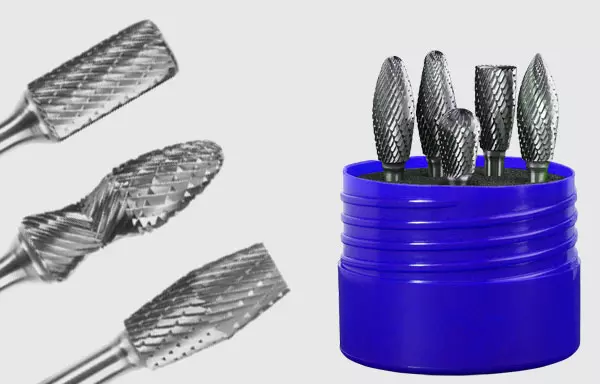
How to choose Special Purpose And Type a custom Burrs
There are many types and models of carbide burrs, and special purposes and types of custom burrs refer to the cylindrical rotary files. Special purpose and type of custom burrs are mainly composed of high-hardness, refractory metal carbides (WC, TiC) micron powder, cobalt (Co), nickel (Ni), and molybdenum (Mo) as binders. Special Purpose And Type a custom Burrs have been used in many aspects, including milling and deburring in the preparation process; welding node processing, forming processing, chamfering of castings, sinking processing, and cleaning. Here are some tips for using it.

1. Choice of tooth thickness of Special Purpose And Type a custom Burrs
The thickness of the teeth of Special Purpose And Type a custom Burrs should be selected according to the allowance of the workpiece, the machining accuracy, and the nature of the material. Coarse-tooth carbide burrs are suitable for machining workpieces with large allowance, low dimensional accuracy, large geometric tolerances, large surface roughness values, and soft materials. Otherwise, fine-tooth carbide burrs should be selected. When used, it should be selected according to the required machining allowance, dimensional accuracy, and surface roughness of the workpiece.
2. Selection of Special Purpose And Type a custom Burrs size
The size of Special Purpose And Type a custom Burrs should be selected according to the size of the workpiece to be processed and the machining allowance. When the processing size is large and the margin is enormous, a large size should be chosen. In the opposite case, choose a smaller size of Special Purpose And Type a custom Burrs.
3. Selection of the tooth pattern of SA shape
The tooth pattern of Special Purpose And Type a custom Burrs ought to be chosen according to the material of the workpiece to be processed. When processing soft materials such as aluminum, copper, mild steel, etc., it is best to use a single-tooth (milling tooth) carbide burr. The single-tooth carbide burr has a large rake angle, a small wedge angle, a large chip pocket, a chip that is not easy to block, and a sharp cutting edge.
When processing materials such as cast iron, stainless steel, titanium alloy, and steel whose HRC is less than 60, cross-tooth carbide burrs or denser teeth should be used. Because such teeth can achieve high cutting volume, high efficiency, and the surface effect of the processed material is good.

Buying Carbide Burrs
We have a variety of premium special purpose and type a custom burrs available for you to purchase from our online shop. For larger quantities or unusual shapes please contact us.